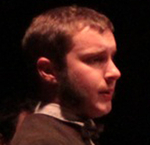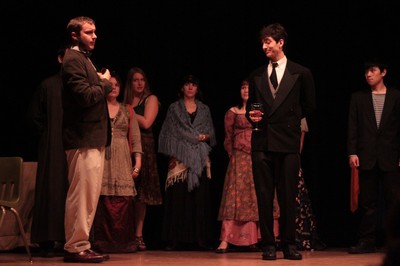 In just eight weeks, students in the Russian Through Theater course gain enough of the language — as well as acting skills — to stage a play at the end of the term.
In just eight weeks, students in the Russian Through Theater course gain enough of the language — as well as acting skills — to stage a play at the end of the term.
Last fall, as in years past, Julia Nemirovskaya’s course, Russian Through Theater, opened the curtains to a packed house at the UO’s Agate Auditorium. The occasion was the one-night-only, full-scale production of Suicide: A Russian Comedy—a famous play originally written by Nikolai Erdman and adapted by Nemirovskaya.
The play was performed almost entirely in Russian by a cast of some 35 UO students—most of whom had little or no Russian language or theater background.
Above: Students in rehearsal for Suicide, A Russian Comedy. Photo: Randianne Leyshon.
The performance was the latest in a decade of Russian plays Nemirovskaya’s class has put on as part of her effort to merge language acquisition and Russian theater. Nemirovskaya, an adjunct assistant professor in the Russian and Eastern European studies program, was born in Russia and grew up around theater, writing plays and text for musicals before moving to the United States in 1991.
Her UO productions are unusual—not only because they are performed in Russian, but because they are written, cast and produced in the impossibly short time of eight weeks. Even more remarkable is that, at the quarter’s outset, the students who act in the plays don’t necessarily speak Russian or have any experience on stage.
For Suicide, the production process began on the first day of class last fall, when Nemirovskaya assessed the skill level of the students enrolled, set the schedule for the quarter and went home to choose a play and adapt a script. By the second week each student was cast in a role. By midterms everyone knew their lines, and by show time, every performer knew each line of the play.
The short timeline would be a challenge for any production, but it is an additional challenge for students who are not fluent Russian speakers. Many in the class are neophytes to the language. To make it onstage and perform with near perfect pronunciation requires hours of practice, sometimes late into the night.
“If I need to spend eight hours with a student who doesn’t pronounce well, I spend eight hours,” said Nemirovskaya.
Nemirovskaya describes the course as the most difficult and exciting class she teaches. She believes that students become fluent more quickly by taking on a Russian character. “The contrast between students’ fluency in week two and week eight is astounding,” she said.
For many who take part in the production, Nemirovskaya’s class stands out among their other academic work. Active alumni reunions are testament to an experience that creates long-lasting relationships.
—Patricia Hickson





 A new course will provide UO students with mobile smart phones and a mission: to build smart-phone apps.
A new course will provide UO students with mobile smart phones and a mission: to build smart-phone apps.
 Two CAS faculty members have been honored with the 2011 UO MLK Award.
Two CAS faculty members have been honored with the 2011 UO MLK Award. Petrarch is not only going digital at the UO, but musical as well.
Petrarch is not only going digital at the UO, but musical as well.